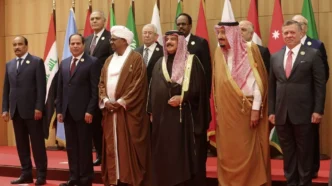The Middle East has quickly become one of the most attractive destinations for global tech investment. Countries like Saudi Arabia, the UAE, and Qatar aren’t just spending big—they’re laying the foundation to become central players in AI, cloud computing, and semiconductor infrastructure. With billions pouring into high-tech campuses, chip deals, and startup ecosystems, the region is moving from consumer to creator in the global tech arena.
But it’s not just about the money. Strategic alliances, regulatory reform, and national ambitions are driving the transformation. And the world is paying close attention.
Strengthening US-Gulf Tech Partnerships
Ties between Gulf nations and the US tech industry have deepened. Recently, the region secured over $2 trillion in investment deals announced during a high-profile visit by US President Donald Trump. These partnerships span artificial intelligence, cloud infrastructure, and defense technologies, reinforcing the Gulf’s position as a serious player in the global innovation race.
Saudi Arabia’s AI venture, Humain—funded by the Public Investment Fund—has already struck deals with Nvidia and AMD to bring thousands of cutting-edge chips into the kingdom. The aim is to train and run AI models locally, removing the need to outsource compute power abroad. Meanwhile, the UAE is pushing ahead with plans to establish one of the world’s largest AI campuses in Abu Dhabi, further cementing its commitment to digital leadership.
These aren’t just one-time deals. They mark the beginning of long-term cooperation. For US tech firms, the Gulf offers a high-growth market for cloud services, semiconductors, and data centers. For Gulf states, localizing AI capabilities is both a sovereignty issue and a national priority.
Building AI-Ready Infrastructure at Scale
To power modern AI, countries need more than ambition—they need serious hardware. And that’s exactly where the Gulf is putting its money. Saudi Arabia’s Humain plans to deploy over 18,000 Nvidia chips, making it one of the most ambitious AI infrastructure efforts in the region.
The UAE is also scaling up rapidly. With support from Amazon and OpenAI, Abu Dhabi will soon host supercomputers and large-scale AI labs. These localized compute clusters will reduce dependence on foreign services, cut latency, and provide better control over sensitive data.
More importantly, these initiatives align with broader national goals. Saudi Arabia’s Vision 2030 places technology at the heart of its economic diversification. The UAE’s AI strategy is racing to position the country as a global AI leader within five years. For both, infrastructure is the backbone of future growth.
Startup Momentum and Investor Optimism
The Middle East isn’t only investing in hardware—it’s also nurturing the next wave of startups. In April 2025 alone, MENA startups raised $228.4 million, more than double the previous month. Fintech and B2B platforms led the charge.
Egypt-based Thndr secured $15.7 million to expand into Saudi Arabia and the UAE, tapping into growing demand for digital investing tools among the region’s young, mobile-first population.
Governments are also playing their part. Saudi Arabia and the UAE are rolling out free zones, tax incentives, and easier licensing to attract entrepreneurs. Public funds are backing early-stage ventures, aiming to foster local talent and reduce dependence on imported tech.
With clearer regulations and faster approvals, founders now have a smoother path from launch to scale. That’s creating a business environment where innovation can thrive—and global VCs are taking notice.
Cloud Expansion and Data Sovereignty
Cloud services are surging across the region, driven by smart cities, digital government programs, and enterprise AI adoption. Oracle recently committed $14 billion to scale its cloud footprint in Saudi Arabia. Google, AWS, and Microsoft are following suit with massive regional data hubs.
These investments are a win-win. They ensure faster, cheaper services for local users while helping countries keep sensitive data within national borders. For local developers, access to reliable cloud infrastructure unlocks new opportunities—from SaaS platforms to AI products tailored to regional needs.
Cloud infrastructure is no longer just a backend—it’s a strategic asset. And the Middle East is building it fast.
Policy Shifts Fuel the Tech Boom
Underpinning all this growth are major policy reforms. Gulf governments are cutting red tape, opening up to foreign ownership, and offering tax breaks to tech investors. These changes are part of a broader plan to move away from oil dependence and build a diversified, innovation-led economy.
Vision 2030 in Saudi Arabia and the UAE’s AI agenda both tie policy to funding, education, and research. Universities are launching AI and computer science programs, preparing a homegrown tech workforce to support the ecosystem.
A more predictable business environment is also helping. Faster decision-making and clearer regulations make it easier for startups and global tech firms alike to operate and expand.
Balancing Growth with Digital Sovereignty
With all eyes on the region, tech investment comes with new questions—who controls the data, and where is it stored? Many governments are now pushing for data residency laws and developing their own AI models to reduce external dependencies.
There’s also growing talk of digital independence. Middle Eastern countries are investing not just in software, but also in chips, research, and homegrown talent. What once felt like a distant goal is now firmly on the horizon.
By securing supply chains and training local engineers, these nations are building not just tech infrastructure—but resilience.
From Tech Buyer to Global Innovator
The Middle East is no longer just a consumer of global tech. It’s becoming a hub for data centers, AI training, cloud infrastructure, and startup innovation. And it’s doing so with strategic intent—focused on long-term influence and economic transformation.
If momentum continues, the region won’t just participate in the global tech industry. It will help shape its future.













